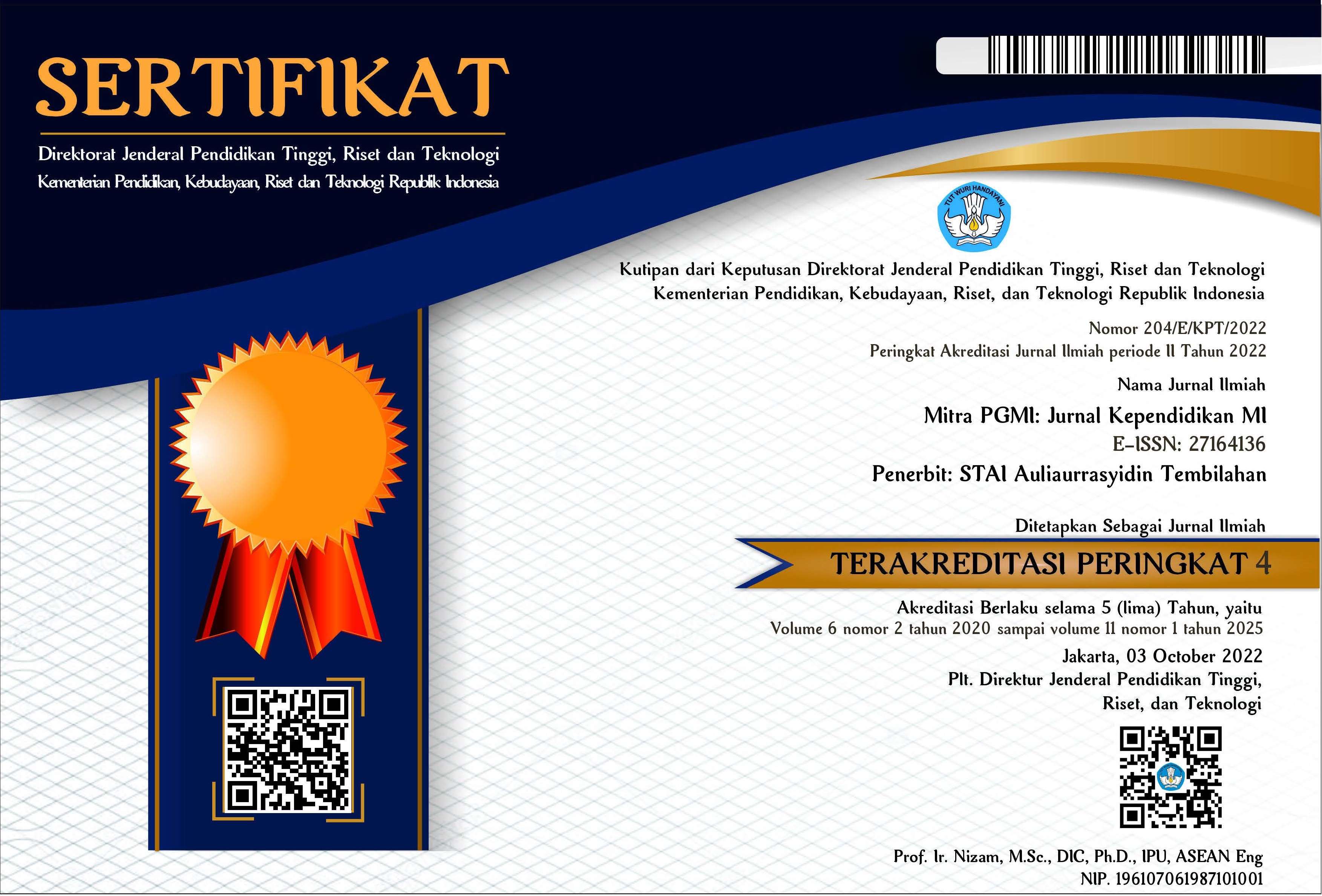Pandangan dan Tantangan Guru dalam Penerapan Metode Socrates untuk Meningkatkan Keterampilan Berpikir Kritis Siswa Sekolah Dasar
DOI:
https://doi.org/10.46963/mpgmi.v10i1.1398Keywords:
Critical Thinking Skills, Socratic Method, ChallangesAbstract
Critical thinking skill is a major concern in education throughout the world, with the aim of preparing students for the learning context of the 21st century. However, many teachers have difficulty adopting this new teaching method. This qualitative research aims to investigate teachers' views and the obstacles they face when implementing the Socratic method, an inquiry-based learning approach, in the classroom. Researchers used a purposive sampling method to select five Indonesian language teachers and conducted semi-structured interviews. Data analysis shows that most teachers see positively the application of the Socratic method in improving students' critical thinking skills. However, they face challenges, especially related to knowledge of teaching materials, questioning skills, student participation, topic selection, and time constraints. Based on these findings, this research recommends the need for additional support for teachers, especially in terms of understanding Indonesian language subject matter and effective teaching skills while implementing the Socratic method in the classroom.
Downloads
References
Abrams, J. R. (2015). Reframing the Socratic method. Journal of Legal Education, 64(4), 562–585.
Acim, R. (2018). The Socratic method of instruction: An experience with a reading comprehension course. Journal of Educational Research and Practice, 8(1), 4.
Akhsani, L., Kartono, K., Junaedi, I., & Asih, T. S. N. A. (2022). Pengaruh Motivasi Belajar Terhadap Kemampuan Berpikir Kreatif Mahasiswa pada Model PBL dengan Metode Socrates. Prosiding Seminar Nasional Pascasarjana (PROSNAMPAS), 5(1), 625–629.
Al-Darwish, S. (2012). The Role of Teacher Questions and the Socratic Method in EFL Classrooms in Kuwait. World Journal of Education, 2(4), 76–84.
Alias, A., Mohtar, L. E., Ayop, S. K., & Rahim, F. R. (2022). A Systematic Review on Instruments to Assess Critical Thinking & Problem-Solving Skills. EDUCATUM Journal of Science, Mathematics and Technology, 9, 38–47.
Anggraena, Y., Ginanto, D., Felicia, N., Andiarti, A., Herutami, N., Alhapip, L., Iswoyo, S., Hartini, Y., & Mahardika, R. L. (2022). Panduan Pembelajaran dan Asesmen Pendidikan Anak Usia Dini, Pendidikan Dasar, dan Menengah. Jakarta: Badan Standar, Kurikulum, Dan Asesmen Pendidikan Kementerian Pendidikan, Kebudayaan, Riset, Dan Teknologi Republik Indonesia.
Bender, W. N. (2012). Project-based learning: Differentiating instruction for the 21st century. Corwin Press.
Cahyani, P. A. H. I., Nurjaya, I. G., & Sriasih, S. A. P. (2015). Analisis keterampilan bertanya guru dan siswa dalam pembelajaran bahasa Indonesia di Kelas X TAV 1 SMK Negeri 3 Singaraja. Jurnal Pendidikan Bahasa Dan Sastra Indonesia Undiksha, 3(1).
Chan, H., & Zahar, I. (2012). Maximizing Learning Outcomes by Socratic Questioning Exploring the Pedagogical Applications and Challenges among Language Lecturers at Universiti Malaysia Kelantan.
Chesters, S. D. (2012). Socratic pedagogy: philosophical inquiry through dialogue. In The Socratic Classroom (pp. 11–40). Brill.
Chorzempa, B. F., & Lapidus, L. (2009). To find yourself, think for yourself. Teaching Exceptional Children, 41(3), 54–59.
Chotimah, B. K., & Wahyudin, A. (2020). Meningkatkan Hasil Belajar Matematika Siswa Melalui Metode Sokratis Materi Statistika: Improving Student Mathematics Learning Results Through the Socratic Method Of Statistics Materials. Abacus: Academic Journal of Mathematics Learning and Education, 1(1), 1–11.
Chusni, M. M., Saputro, S., Suranto, S., & Rahardjo, S. B. (2020). Review of critical thinking skill in indonesia: Preparation of the 21st century learner. Journal of Critical Reviews, 7(9), 1230–1235.
Cleveland, J. (2015). Beyond standardization: Fostering critical thinking in a fourth grade classroom through comprehensive Socratic circles. Arizona State University.
Copelin, M. R. (2015). “Socratic Circles are a Luxury”: Exploring the Conceptualization of a Dialogic Tool in Three Science Classrooms. University of Arkansas.
Creswell, J. W. (2010). Research Design: Qualitative, Quantitative, and Mixed Methods Approach, diterj. Achmad Fawaid: Research Design: Pendekatan Kualitatif, Kuantitatif, Dan Mixed, Yogyakarta: Pustaka Pelajar.
Danawak, Y. (2022). Tinjauan filsafat metode dialog socrates dan implementasinya terhadap pembelajaran matematika. PRISMA, Prosiding Seminar Nasional Matematika, 5, 44–49.
Delić, H., & Bećirović, S. (2016). Socratic method as an approach to teaching. European Researcher. Series A, 10, 511–517.
Dös, B., Bay, E., Aslansoy, C., Tiryaki, B., Çetin, N., & Duman, C. (2016). An Analysis of Teachers’ Questioning Strategies. Educational Research and Reviews, 11(22), 2065–2078.
Dwyer, C. P., Hogan, M. J., & Stewart, I. (2014). An integrated critical thinking framework for the 21st century. Thinking Skills and Creativity, 12, 43–52.
Eggen, P., & Kauchak, D. (2012). Strategi dan model pembelajaran. Jakarta: Indeks.
Elder, L., & Paul, R. (2019). The thinker’s guide to analytic thinking: How to take thinking apart and what to look for when you do. Rowman & Littlefield.
Esa, M. E., Awang, M. M., Ahmad, A. R., & Ahmad, A. (2019). Developing Thinking Skills Among Students Towards Creating Quality Human Capital. The 2nd International Conference on Sustainable Development and Multi-Ethnic Society, 208–215.
Etemadzadeh, A., Seifi, S., & Far, H. R. (2013). The role of questioning technique in developing thinking skills: The ongoing effect on writing skill. Procedia-Social and Behavioral Sciences, 70, 1024–1031.
Fawaid, A., Abdullah, A., & Huda, M. (2023). Re-Designing Independent Campus Model in Islamic Boarding School Higher Education. Al-Tanzim: Jurnal Manajemen Pendidikan Islam, 7(4), 1202–1220.
Fawaid, A., & Hasanah, U. (2020). Pesantren Dan Religious Authoritative Parenting: Studi Kasus Sistem Wali Asuh di Pondok Pesantren Nurul Jadid. Jurnal Ilmiah Ilmu Ushuluddin, 19(1), 27–40.
Fishman, E. M. (1985). Counteracting misconceptions about the Socratic method. College Teaching, 33(4), 185–188.
Fitriyah, C. Z., & Wardani, R. P. (2022). Paradigma Kurikulum Merdeka Bagi Guru Sekolah Dasar. Scholaria: Jurnal Pendidikan Dan Kebudayaan, 12(3), 236–243.
Flick, U., Steinke, I., & Kardoff, E. von. (2017). Buku induk penelitian kualitatif: Paradigma, teori, metode, prosedur, dan praktik. Yogyakarta. Cantrik Pustaka.
Fullam, J. (2015). “Listen Then, or, Rather, Answer”: Contemporary Challenges to Socratic Education. Educational Theory, 65(1), 53–71.
Hadi, S., Retnawati, H., Munadi, S., Apino, E., & Wulandari, N. F. (2018). The difficulties of high school students in solving higher-order thinking skills problems. Problems of Education in the 21st Century, 76(4), 520.
Ismah, I., & Muthmainnah, R. N. (2021). Penerapan metode socrates kontekstual untuk meningkatkan tingkat berfikir kritis matematis. FIBONACCI: Jurnal Pendidikan Matematika Dan Matematika, 7(1), 61–68.
Jensen Jr, R. D. (2015). The Effectiveness of the Socratic Method in Developing Critical Thinking Skills in English Language Learners. Online Submission.
Katsara, O., & De Witte, K. (2019). How to use Socratic questioning in order to promote adults’ self-directed learning. Studies in the Education of Adults, 51(1), 109–129.
Khaliq, I., Azzahra, A., Safitri, A., & Muthmainnah, R. N. (2017). Upaya Meningkatkan Daya Berpikir Kritis Matematis Siswa dengan Menggunakan Metode Socrates Kontekstual. FIBONACCI: Jurnal Pendidikan Matematika Dan Matematika, 3(1), 23–30.
Knežić, D., Elbers, E., Wubbels, T., & Hajer, M. (2013). Teachers’ Education in Socratic Dialogue: Some Effects on Teacher–Learner Interaction. The Modern Language Journal, 97(2), 490–505.
Kusmaryani, W. (2016). Assessing student’s speaking through Socratic questioning method. Ninth International Conference on Applied Linguistics (CONAPLIN 9), 338–341.
Lam, F. (2011). The Socratic method as an approach to learning and its benefits.
Le, N.-T., & Huse, N. (2016). Evaluation of the formal models for the Socratic method. Intelligent Tutoring Systems: 13th International Conference, ITS 2016, Zagreb, Croatia, June 7-10, 2016. Proceedings 13, 69–78.
Makhene, A. (2019). The use of the Socratic inquiry to facilitate critical thinking in nursing education. Health SA Gesondheid, 24.
Manurung, Y. H., & Siregar, F. S. (2018). Developing Students Critical Thinking on Speaking Through Socratic Questioning Method. International Conference on Language, Literature, and Education (ICLLE 2018), 212–216.
Maras, K. E. (2018). Mind, language and artworks as real constraints on students’ critical reasoning about meaning in art. International Journal of Art & Design Education, 37(3), 530–540.
Nappi, J. S. (2017). The importance of questioning in developing critical thinking skills. Delta Kappa Gamma Bulletin, 84(1), 30.
Nurdiansyah, N., Johar, R., & Saminan, S. (2019). Keterampilan Bertanya Guru SMP dalam Pembelajaran Matematika. Jurnal Peluang, 7(1), 44–54.
Nurjannah, A., & Suprapto, N. (2014). Pengaruh penerapan pembelajaran Socrates terhadap keterampilan berpikir kritis dalam pembelajaran fisika pada materi hukum Newton. Jurnal Inovasi Pendidikan Fisika (JIPF) Vol, 3, 20–26.
Oyler, D. R., & Romanelli, F. (2014). The Fact of IgnoranceRevisiting the Socratic Method as a Tool for Teaching Critical Thinking. American Journal of Pharmaceutical Education, 78(7).
Pahlavi, S. R., Sutriyono, S., & Prihatnani, E. (2014). Pengaruh Metode Socrates Dalam Pembelajaran Bangun Datar Terhadap Kemampuan Berpikir Kritis Siswa Kelas Vii Smp Kristen Satya Wacana Tahun Ajaran 2013/2014. Satya Widya, 30(1), 28–33.
Pange, A. (2014). The Use of the Socratic Teaching Method in E-Learning 2.0 Settings: Challenges and Limitations. In Online Tutor 2.0: Methodologies and Case Studies for Successful Learning (pp. 201–214). IGI Global.
Pangestuti, D. S., & Latifah, N. (2019). Pengaruh metode socrates terhadap kemampuan berpikir kritis. Wacana Akademika: Majalah Ilmiah Kependidikan, 3(1), 85–94.
Paul, R., & Elder, L. (2007). Critical thinking: The art of Socratic questioning. Journal of Developmental Education, 31(1), 36.
Permana, T. I., Hindun, I., Rofi’ah, N. L., & Azizah, A. S. N. (2019). Critical thinking skills: The academic ability, mastering concepts, and analytical skill of undergraduate students. JPBI (Jurnal Pendidikan Biologi Indonesia), 5(1), 1–8.
Polat, S. (2020). Multidimensional analysis of the teaching process of the critical thinking skills. Research in Social Sciences and Technology, 5(2), 134–157.
Prilanita, Y. N., & Sukirno, S. (2017). Peningkatan Keterampilan Bertanya Siswa melalui Faktor Pembentuknya. Jurnal Cakrawala Pendidikan, 36(2), 244–256.
Putri, M. K., & Sani, R. A. (2015). PENGARUH MODEL PEMBELAJARAN DISKUSI KELAS DENGAN METODE SEMINAR SOCRATES TERHADAP HASIL BELAJAR SISWA MATERI KALOR KELAS X SMA NEGERI 8 MEDAN TP 2013/2014. INPAFI (Inovasi Pembelajaran Fisika), 3(1).
Riffel, C. (2014). The Socratic method reloaded: How to make it work in large classes? Canterbury Law Review, 20, 125–135.
Rohma, F., & Fawaid, A. (2023). Analysis of Students’ Difficulties In Reading Texts to Increase Reading Comprehension In Islamic Senior High School. Al Qalam: Jurnal Ilmiah Keagamaan Dan Kemasyarakatan, 17(3), 2003–2018.
Ryan, E., Shuai, X., Ye, Y., & Haomei, L. (2013). When Socrates meets Confucius: Teaching creative and critical thinking across cultures through multilevel Socratic method. Neb. L. Rev., 92, 289.
Sarosa, S. (2021). Analisis data penelitian kualitatif. Pt Kanisius.
Schrijnemaekers, A.-C. M. C., Winkens, I., Rasquin, S. M. C., Verhaeg, A., Ponds, R. W. H. M., & van Heugten, C. M. (2018). Effectiveness and feasibility of Socratic feedback to increase awareness of deficits in patients with acquired brain injury: Four single-case experimental design (SCED) studies. Neuropsychological Rehabilitation.
Sholihah, D. A., & Shanti, W. N. (2017). Diposisi berpikir kritis matematis dalam pembelajaran menggunakan metode socrates. Jurnal Karya Pendidikan Matematika, 4(2), 1–9.
Smakova, K. M., & Tlekeyeva, A. D. (2019). Constructing Communicative Competence By Applying Socratic Questioning Into The Efl Classroom. Of Philological Cycle, 24.
Sorvatzioti, D. F. (2012). The Socratic method of teaching in a multidisciplinary educational setting. International Journal of Arts & Sciences, 5(5), 61.
Suhadi, S. M., Mohamed, H., Zaid, N. M., Abdullah, Z., & Aris, B. (2016). The Online Socratic Approach and Its Relationship with The Level Of Bloom Taxonomy Mastery. ICERI2016 Proceedings, 7860–7866.
Susetyarini, E., & Fauzi, A. (2020). Trend of Critical Thinking Skill Research in Biology Education Journals across Indonesia: From Research Design to Data Analysis. International Journal of Instruction, 13(1), 535–550.
Susiani, K., & Suranata, K. (2017). Implementasi metode sokratik melalui lesson study untuk meningkatkan keterampilan berpikir kritis mahasiswa. Indonesian Journal of Educational Counseling, 1(1), 27–40.
Vincent Hogshead, R. M. (2017). How An English Teacher May Draw from The Socratic Seminar Method In Order To Further Engage Tenth Grade Students During Discussion.
Wiggins, J. (2015). Constructivism, policy, and arts education. In Arts Education Policy Review (Vol. 116, Issue 3, pp. 115–117). Taylor & Francis.
Wilberding, E. (2021). Socratic Methods in the Classroom: Encouraging Critical Thinking and Problem Solving Through Dialogue (Grades 8-12). Routledge.
Yang, Y.-T. C., Newby, T. J., & Bill, R. L. (2005). Using Socratic questioning to promote critical thinking skills through asynchronous discussion forums in distance learning environments. The American Journal of Distance Education, 19(3), 163–181.
Youens, B., Smethem, L., & Sullivan, S. (2014). Promoting collaborative practice and reciprocity in initial teacher education: realising a ‘dialogic space’through video capture analysis. Journal of Education for Teaching, 40(2), 101–113.
Zare, P., & Mukundan, J. (2015). The use of Socratic method as a teaching/learning tool to develop students’ critical thinking: A review of literature. Language in India, 15(6), 256–265.
Downloads
Published
Issue
Section
License
Copyright (c) 2024 Achmad Fawaid, Nadifah Nadifah

This work is licensed under a Creative Commons Attribution-ShareAlike 4.0 International License.
Authors who publish with this journal agree to the following terms:
1. Copyright on any article is retained by the author(s).
2. The author grants the journal, right of first publication with the work simultaneously licensed under a Creative Commons Attribution shareAlike 4.0 International License that allows others to share the work with an acknowledgment of the work’s authorship and initial publication in this journal.
3. Authors are able to enter into separate, additional contractual arrangements for the non-exclusive distribution of the journal’s published version of the work (e.g., post it to an institutional repository or publish it in a book), with an acknowledgment of its initial publication in this journal.
4. Authors are permitted and encouraged to post their work online (e.g., in institutional repositories or on their website) prior to and during the submission process, as it can lead to productive exchanges, as well as earlier and greater citation of published work.
5. The article and any associated published material is distributed under the Creative Commons Attribution-ShareAlike 4.0 International License








2.png)


